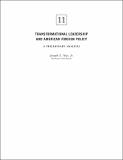Transformational Leadership And American Foreign Policy: A Preliminary Analysis
Author(s)
Nye, Joseph S., Jr.
DownloadCPL_WP_06_11_Nye.pdf (142.3Kb)
Terms of use
Metadata
Show full item recordAbstract
Foreign policy is usually over-determined. The “national interest” often appears to be an immutable dictation of the international system and of domestic politics. As Henry Kissinger put it when he was Secretary of State, “the essential outlines of U.S. policy will remain the same no matter who wins the U.S. Presidential election” (Wittkopf, 2003, 524). Yet sometimes, “reality” is more malleable than it first appears. Not so long ago, it seemed “unimaginable” that the Soviet Union would disappear and Germany would be peacefully reunited. As former National Security Advisor Brent Scowcroft put it in 2003, the main divisions in foreign policy today are not between liberals and conservatives, but between the traditionalists and the transformationalists.1 The transformationalists believe that “we know what has to be done and have the power to do it. What has to be done is to transform the Middle East into a collection of democracies. That will bring peace and stability” (Rothkopf, 2005, 428). Transformational leadership has become a central part of the current debate about American foreign policy.
Date issued
2006-01-11Publisher
Center for Public Leadership
Series/Report no.
Center for Public Leadership Working Paper Series;06-11
Keywords
cpl, hks, kennedy school, leadership, transform, american foreign policy, foreign policy, president, transformational leadership
Collections
The following license files are associated with this item: